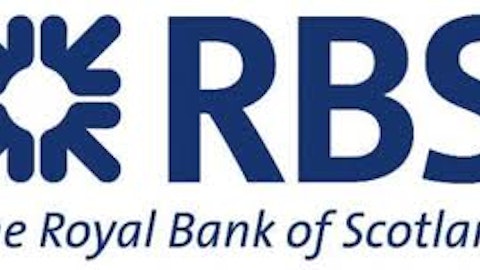After Barclays PLC (ADR) (NYSE:BCS) received a $430 million fine last year for rigging the LIBOR, the bank decided to do some introspection. Management commissioned an internal investigation in to what went wrong, and what the bank could look out for in the future to avoid a relapse. In summary, “The culture that emerged tended to favor transactions over relationships, the short term over sustainability and financial over other business purposes.”

Making bank
The report concluded that pay was one of the main drivers of the risk-taking attitude that pervaded Barclays PLC (ADR) (NYSE:BCS) throughout the 2000s. During that period, Bob Diamond — who would go on to become CEO — was running the investment arm of the bank with a calculating genius that helped Barclays PLC (ADR) (NYSE:BCS) generate 23 billion pounds in revenue during 2007. At that time, the bank employed 140,000 people across the world. It shouldn’t come as a surprise that the report faulted the bank for becoming “complex to manage.”
To sustain that size, traders in the investment bank had to make a lot of money. As a result, they expected to be paid large sums. So far, so good. The problem came when the equation reversed itself. Bankers were no longer being paid big bonuses to accomplish the goal of making the bank money, they were making the bank money to accomplish the goal of being paid big bonuses.
The solution
The report is being heralded as a meaningful step in the right direction. From all accounts, the more than 200-page tome doesn’t pull any punches, and Barclays PLC (ADR) (NYSE:BCS) has made the whole thing available for the general public. CEO Antony Jenkins has already made big steps toward repairing the bank’s reputation. In addition to the report, he has closed the bank’s tax avoidance division and trimmed down some of the company’s fat.
The same sorts of moves need to be made across the sector. Recently, companies like HSBC Holdings plc (ADR) (NYSE:HBC) and Lloyds Banking Group PLC (ADR) (NYSE:LYG) have been fined for money laundering and insurance mis-selling, respectively. Those banks have yet to win back the public’s trust and seem to have done little to address their underlying faults. To Lloyds Banking Group PLC (ADR) (NYSE:LYG)’ credit, it quickly capitulated after it came under scrutiny for mis-selling. HSBC, meanwhile, has admitted to its past failures while insisting that it’s now in a very different place.
The bottom line
There’s still more talk than action in the sector, and it will be interesting to see if other banks follow in Barclay’s footsteps. The road to winning back the public is a long and arduous one, and ignoring the past isn’t going to fix what’s wrong. As banks start to bounce back, they need to keep the bad years in mind so they don’t come back to haunt investors, or the general public. One step at a time, I suppose.
The article Banks Begin the Journey Back to Respectability originally appeared on Fool.com and is written by Andrew Marder.
Fool contributor Andrew Marder owns shares of Barclays. The Motley Fool has no position in any of the stocks mentioned.
Copyright © 1995 – 2013 The Motley Fool, LLC. All rights reserved. The Motley Fool has a disclosure policy.

